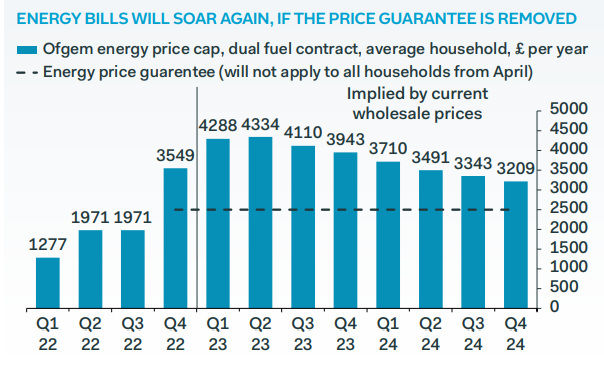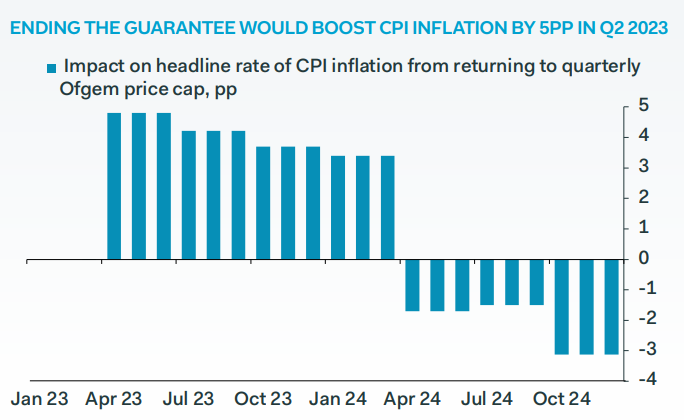Chancellor's Tweaks to Energy Price Scheme Could Add 5% to UK Inflation
- Written by: James Skinner
"Until we get more details from the government, we are not revising our forecasts for GDP, CPI inflation or Bank Rate. A U-turn on the U-turn is a very real possibility, given that both Chancellors Sunak and Kwarteng failed to find targeted ways of supporting households," - Pantheon Macroeconomics

Image © Adobe Images
UK inflation could be around five percent higher than otherwise from April 2023 if the latest Chancellor's plan to means-test access to the government's Energy Price Guarantee goes ahead, according to Pantheon Macroeconomics, as this would see further price increases passed on to households.
While it would not be a bad thing if official measures of consumer price inflation do better reflect changes in wholesale prices of the items concerned, inflation would rise as a result of any decision to restrict access to the government scheme intended to cap household energy bills.
"Chancellor Hunt's signal that the Treasury will not shield all households and businesses from higher energy prices beyond April has further darkened the outlook for economic activity next year," says Samuel Tombs, chief UK economist at Pantheon Macroeconomics.
"As our first chart shows, we calculate on the basis of current wholesale prices that Ofgem would set a default tariff price cap in April that would result in annualised costs rising to £4,334 for the average household," Tombs wrote in a Wednesday research briefing.
 Source: Pantheon Macroeconomics.
Source: Pantheon Macroeconomics.
Tombs and colleauges estimate disposable incomes would fall by a total 6.2% from April if recent changes in the wholesale cost of energy are passed onto households and in part because the £400 annual discount created by the Energy Bills Support Scheme is also set to end around the same time.
That would amount to a significant direct loss of spending within the real economy that also serves to lift the annual rate of inflation by up to five percentage points over the second quarter of next year, although this latter impact is partly the result of earlier price increases affording electricity and gas a larger share of the consumer price index.
"But many firms will find it harder to raise prices in six months' time than otherwise, given the likelihood that consumer demand will have dropped materially by then in response to higher borrowing costs, and other fiscal measures," Tombs said on Wednesday.
"What's more, the unemployment rate likely will be materially higher in April than at present, reducing the risk that wages respond to the increase in energy bills, and so boost domestically-generated inflation," he added.
UK inflation returned to the double-digit percentages in September when rising from 9.9% to 10.1% due to rising food prices as well as increases in the cost of housing and household services, according to Office for National Statistics data released on Wednesday.
 Source: Pantheon Macroeconomics.
Source: Pantheon Macroeconomics.
The Energy Price Guarantee scheme was announced in late September and intended to reduce household energy bills over the next two years so that a typical family pays around £2,500, which is roughly £1,000 per year less than would likely have been paid otherwise.
However, the latest Chancellor implied in parliament on Tuesday that "a Treasury-led review into how we support energy bills beyond April next year," could see at least some households paying the full cost of wholesale market prices and more from the second quarter 2023.
The decision was motivated by a tantrum in the bond market that has led some parts of parliament to become concerned about "fiscal sustainability" and "the confidence of the markets" but with no detail available currently it is not yet possible for economists to estimate what the impact on the economy will be.
"Until we get more details from the government, we are not revising our forecasts for GDP, CPI inflation or Bank Rate. A U-turn on the U-turn is a very real possibility, given that both Chancellors Sunak and Kwarteng failed to find targeted ways of supporting households," Tombs said.
"Wholesale energy prices also might fall back, making it feasible for the government to continue with the EPG. Indeed, we estimate that the cost of the first six months of the scheme has dropped to £52B, from £60B, due to the fall in wholesale prices since the EPG was announced," he added.



